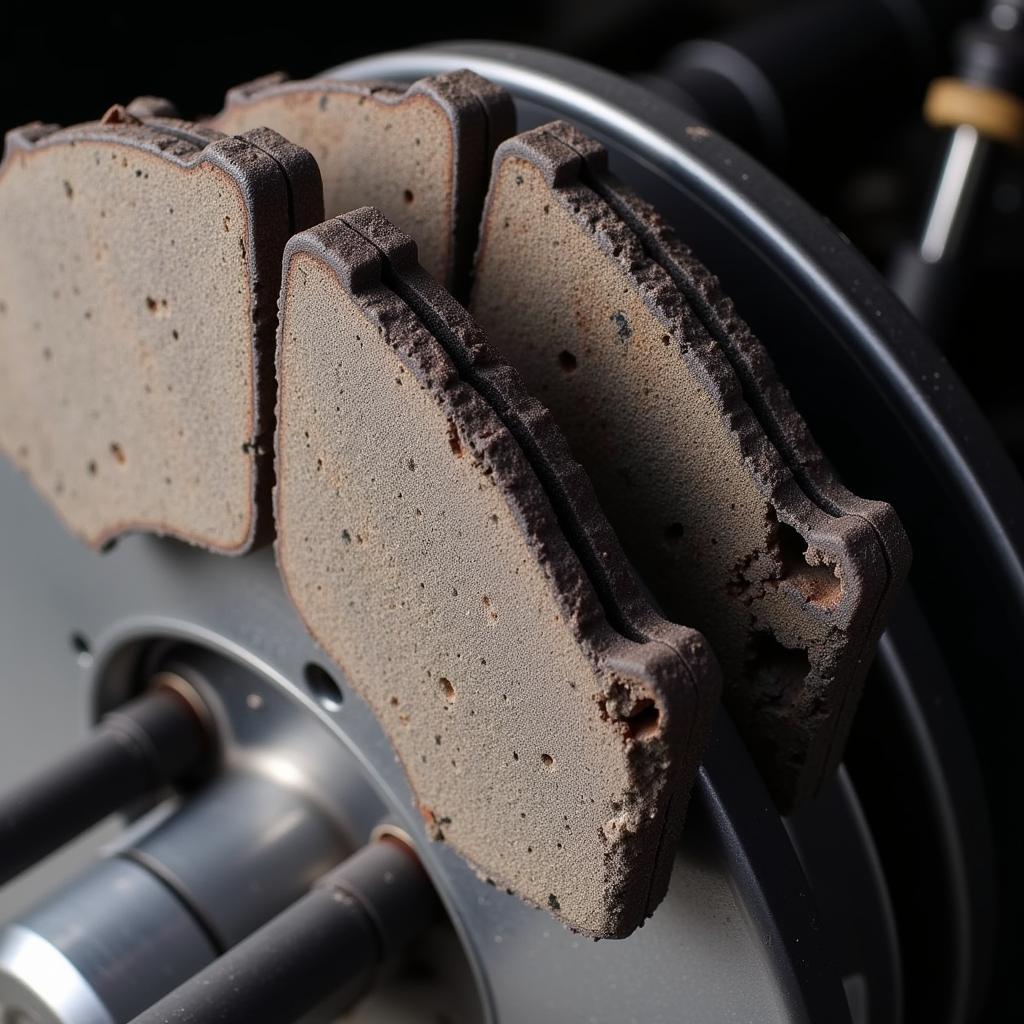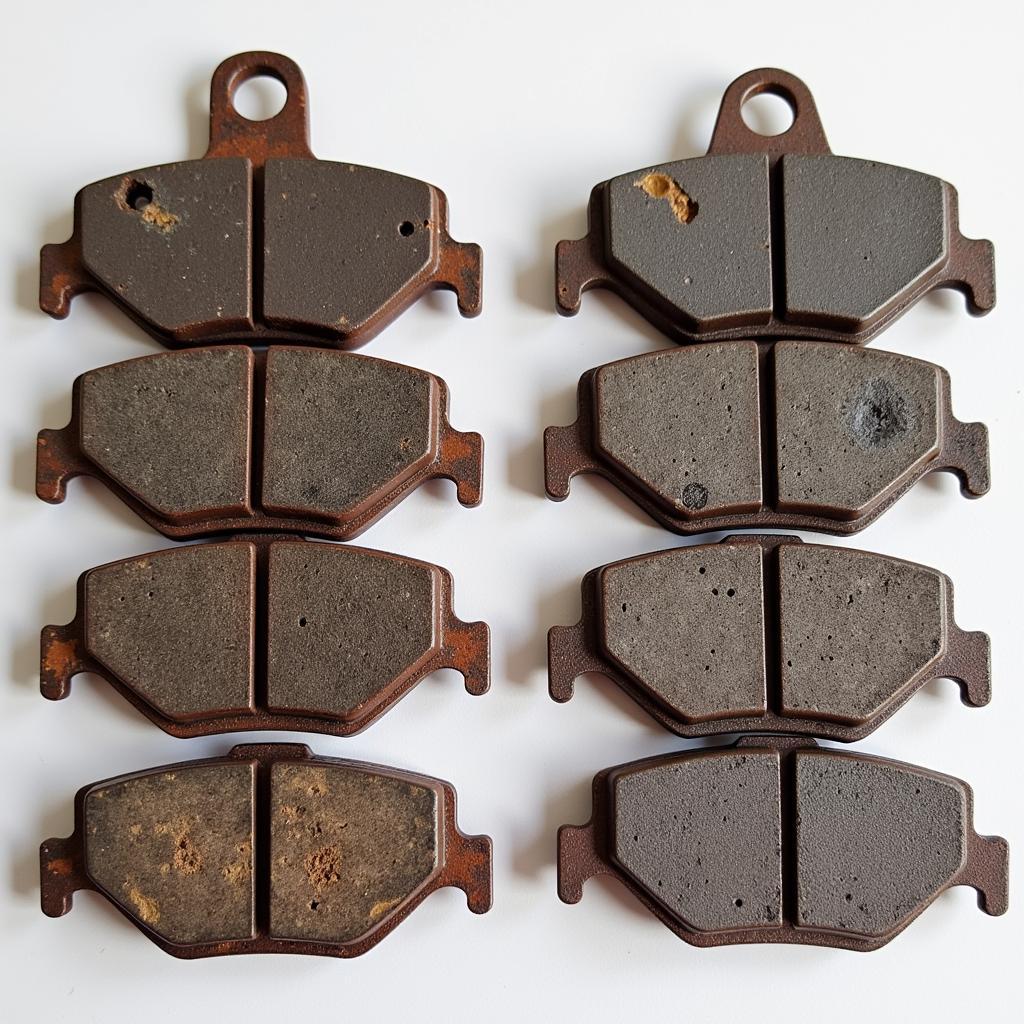The Range Rover Evoque is a luxurious and capable SUV, but like any vehicle, it requires regular maintenance. One of the most important aspects of car care is monitoring your brake system. If you’re seeing a Range Rover Evoque brake pad warning, it’s crucial to address it promptly. This article will guide you through the common causes of this warning light, what it means for your vehicle, and what steps you can take to rectify the issue.
Understanding Your Evoque’s Brake Pad Warning System
Your Evoque is equipped with sensors designed to alert you when the brake pads wear down to a certain level. This early warning system helps prevent more costly repairs down the line by ensuring you don’t drive with dangerously thin brake pads. When the sensors detect a problem, the “brake pad warning” light illuminates on your dashboard.
What Causes the Brake Pad Warning Light to Come On?
There are several reasons why your Range Rover Evoque brake pad warning light might turn on:
- Worn Brake Pads: This is the most common cause. As you use your brakes, the friction material on the pads gradually wears down. When the pads reach a predetermined thickness, the sensor triggers the warning light.
- Faulty Brake Pad Sensor: While less common, it’s possible for the sensor itself to malfunction. This could be due to damage to the sensor wire or a faulty connection.
- Low Brake Fluid: Brake fluid is essential for transmitting force from the brake pedal to the calipers, which engage the brake pads. Low brake fluid level can trigger the warning light as it can also indicate a leak in the system.
- Other Brake System Issues: In some instances, the warning light might indicate a more serious issue with the braking system, such as a problem with the ABS (Anti-lock Braking System).
 Worn Brake Pads Range Rover Evoque
Worn Brake Pads Range Rover Evoque
What to Do When Your Brake Pad Warning Light Comes On
If your Range Rover Evoque brake pad warning light illuminates, it’s crucial not to ignore it. Here’s a step-by-step guide on what to do:
- Check Your Brake Fluid Level: The brake fluid reservoir is typically located under the hood on the driver’s side. If the fluid level is low, add the correct type of brake fluid for your Evoque. Consult your owner’s manual for guidance.
- Inspect Your Brake Pads: If you’re comfortable doing so, you can visually inspect your brake pads. Look through the spaces between the spokes of your wheels to see the brake caliper and pads. If the pad material is significantly thin (less than 1/4 inch), they likely need replacing.
- Schedule a Professional Inspection: If you’re unsure about the cause of the warning light or uncomfortable performing the checks yourself, schedule an inspection with a qualified mechanic specializing in Range Rover vehicles. They have the expertise and equipment to diagnose the issue accurately.
The Importance of Timely Brake Pad Replacement
Timely brake pad replacement is critical for maintaining your Range Rover Evoque’s safety and performance:
- Optimal Braking Performance: Worn brake pads reduce braking efficiency, increasing stopping distances and the risk of accidents.
- Prevents Damage to Other Brake Components: Driving with worn brake pads can damage the brake rotors, calipers, and other brake system components, leading to more expensive repairs.
- Peace of Mind: Knowing your brakes are in good condition provides peace of mind and ensures a safe and enjoyable driving experience.
“Ignoring your Range Rover Evoque’s brake pad warning light is like ignoring a flashing “check engine” light – it’s crucial to address the issue promptly to prevent further damage and ensure your safety on the road,” advises Mark Stevenson, a senior automotive technician with over 20 years of experience working on luxury vehicles.
Preventing Premature Brake Pad Wear
While brake pad wear is inevitable with use, you can extend their lifespan and optimize your Evoque’s braking performance by adopting these practices:
- Smooth Braking: Avoid hard braking whenever possible. Gradual braking reduces the wear and tear on your brake pads.
- Maintain a Safe Following Distance: Keeping a safe distance from other vehicles allows for more time to react and brake gently, reducing stress on your brakes.
- Lighten Your Load: Carrying excessive weight puts additional strain on your braking system, accelerating brake pad wear. Travel light whenever possible.
Conclusion
Addressing a Range Rover Evoque brake pad warning promptly ensures your safety and prevents more costly repairs in the future. Remember, maintaining your vehicle’s braking system is crucial for a safe and enjoyable driving experience.
range rover evoque brake pad warning light is a serious issue that needs to be addressed immediately. Don’t wait until it’s too late!
If you’re unsure about diagnosing or addressing brake-related issues yourself, seek assistance from a qualified mechanic specializing in Range Rover vehicles.
Regular maintenance and proactive care will keep your Evoque performing at its best for miles to come.

